Tire Chalking And The Fourth Amendment
A Federal Appeals Court recently found that chalking the tires of a car parked in a public place is a violation of the Fourth Amendment. It's not at all clear that this decision is correct.
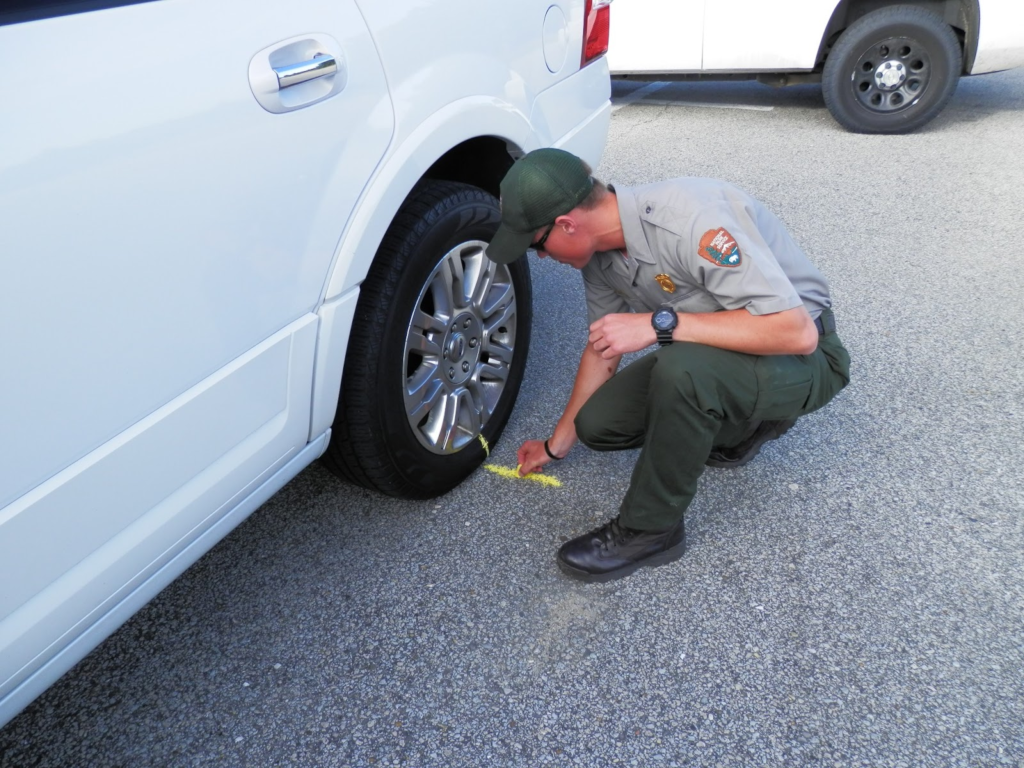
As James Joyner noted last week, the 6th Circuit Court of Appeals issued a ruling finding that the practice of marking tires to track whether a car has violated parking regulations violated the Fourth Amendment to the Constitution:
There is a dance that takes place every weekday in cities and towns across the country, and it begins with people walking outside to look at their tires.
If there is a chalk mark, they know that sometime in the next hour or two, they will need to move their cars to avoid a parking ticket. No mark? They return to work, only to come back out later and check again.
“The parking-lot shuffle,” said Alison Taylor, 38, who works in the advertising department of the local newspaper in Saginaw, Mich.
Thanks to Ms. Taylor, this strange dance may be coming to an abrupt end. She sued the city of Saginaw, and on Monday, a panel of three federal judges hearing an appeal in the case ruled unanimously that the police practice of chalking tires to tell whether a car overstays the time limit on a parking space is unconstitutional.
Chalking violates the Fourth Amendment’s ban on unreasonable searches and seizures, the Sixth Circuit Court of Appeals judges said, reversing a lower court’s decision to dismiss the suit and sending it back for trial instead.
Chalking is a straightforward exercise. A parking enforcement officer marks the tires of cars parked in time-limited spots; when the officer returns later, the mark, a sort of pre-emptive scarlet letter, reveals that it has been there an illegally long time. Though officers these days may also take time-stamped photographs to document the infraction, “chalking tires is very old-fashioned,” said Donald Shoup, a professor of urban planning at the University of California, Los Angeles. “The first references I’ve seen to it were in the 1920s.”
Every city with a parking ordinance probably used chalking at one time, Professor Shoup said, but the practice is becoming less common, replaced by computerized meters, pay-by-phone apps and digital vehicle recognition systems, including one called autoChalk. The manual version has always been arbitrary and inefficient anyway, Professor Shoup said:
“The enforcement is kind of random, so whenever you get a ticket you say, ‘Why me?'”
The legal campaign against chalking in Saginaw started on a weekday in the fall of 2016, when Matthew Gronda, a local lawyer, was sitting in his car outside the county courthouse talking on the phone to another lawyer, Philip Ellison. During their conversation, a parking enforcement officer came by and chalked Mr. Gronda’s tire.
“Hey, this is a search,” Mr. Gronda recalled telling Mr. Ellison.
In no small part, the argument raised by the Plaintiff’s and the opinion issued by the 6th Circuit relied heavily on a Supreme Court case from several years ago called United States v. Jones, which I wrote about at the time the decision was handed down. In that case, Federal law enforcement had planted a GPS location device on the Defendant’s primary means of transportation and used it to track his movements as part of their criminal investigation. The Supreme Court ruled unanimously that the officers had violated Jones’s Fourth Amendment rights but there was not a broad agreement among the Justices for why this was the case. The result was an opinion that, while unanimous in agreement on how the case should be decided, failed to provide much guidance on why this was the case.
The Plaintiff in the tire marking case used the rationale provided by Justice Scalia’s opinion for the Court, which essentially argued that placing the GPS device on Jones’s vehicle was a trespass forbidden by the 4th Amendment. Similarly, the Sixth Circuit panel found that the policy in question served no legitimate public safety purpose and that enforcement of the parking regulation by the City of Saginaw. Michigan, where the incident took place.
Since it was issued last week, though, this decision has come under some scrutiny with many wondering how marking a tire on a car parked in a public place (as opposed to private property as happened in the Jones case) is a Fourth Amendment violation. Orin Kerr, who writes frequently about the Fourth Amendment at The Volokh Conspiracy is among those who is skeptical of the ruling:
(1) From a practical perspective, this is a really important decision. It concludes that a routine practice that wasn’t thought to be illegal (if it was thought of at all) is actually unconstitutional. I’m not sure if the decision is correct. And as I’ll explain below, there are several plausible but debatable moves in the opinion. But this decision is now binding in the Sixth Circuit and may also be followed elsewhere: Traffic enforcement officers around the country should be paying attention to this.
(2) Is the decision right? As I said above, I’m not sure. United States v. Jones introduced the idea of the trespass or physical intrusion test for searches in 2012. As I’ve written before, Jones could mean a lot of different things. It’s just not yet clear what the standard is or how it should apply. Given that, I think the result in Taylor is plausible but that it’s also subject to several plausible objections.
(3) Start with the question of trespass. First, the court takes from Jones the idea that the test is “common law trespass.” Maybe that’s the test. But maybe it’s not. The Court in Florida v. Jardines notably did not describe the Jones test as a trespass test. Instead, Jardines described the test as “physical intrusion.” That’s potentially pretty different. And assuming the test is common law trespass, figuring out what kind of trespass test that meant is actually pretty tricky. Maybe it’s the Restatement test, but maybe it’s something different.
(4) I’m also not sure of the court’s conclusion that the chalking was “to obtain information,” needed to satisfy the search test from Jones. That’s certainly a possible result. But it also strikes me as a somewhat awkward fit.
(5) Assuming the chalking is a search, the next question is whether it is constitutionally reasonable. I agree with the Court’s analysis of the automobile exception and the community care-taking exception. But I suspect some courts might disagree with the Sixth Circuit’s reasonableness analysis on the ground that chalking is a de minimis search as part of a regulatory scheme. It’s just putting a temporary mark on a tire, it causes no damage, and it doesn’t reveal anything. Some courts have articulated doctrines that allow low-level searches as reasonable based on a balancing of interests without particularized suspicion. I can imagine that as a possible path for other courts. We’ll see.
(6) I have to wonder how much this issue matters in a world of smart phones. Everyone is now carrying around a camera. Instead of chalking the tire, the parking folks can just take a picture of the car. They can figure out if the car moved by comparing the pictures at Time A and Time B to see if the car is in the same place. It may be more complicated or expensive than chalking, but it avoids the Fourth Amendment concern by just observing what is in public without any physical attachment to property.
(7) Finally, it’s not at all clear what if any remedies may be applicable. Chalking is common and hasn’t been thought to be illegal. Given that, qualified immunity should attach and civil suits against the officers won’t work. And it’s not clear that there is any exclusionary rule available in an enforcement action to pay the parking ticket, as that is a civil proceeding and the exclusionary rule may not apply under United States v. Janis.
Kerr is far better versed in Fourth Amendment law than I am so if he is ultimately unsure about whether or not the 6th Circuit got this matter right then you can rest assured that there is not an easy answer to the question. Had you asked me before this decision if I thought that chalking a tire parked in a public place for the purpose of parking enforcement, which is ultimately a civil matter rather than a criminal one, I would have most likely said no.
One of the main reasons for that is the fact that this all happened on a public street where the relevant parking regulations are presumable well-indicated to drivers. As such, Taylor did not have a reasonable expectation of privacy when it comes to the question of whether or not her car moved over the relevant time period, which is the reason that parking enforcement officers use methods like chalking to track whether a car has moved or not. This is different from Jones in that law enforcement in that case entered on Jones’s property to place the GPS device on his vehicle, even taking the step of removing a tarp that was covering the vehicle in the process. This was a clear violation of Jones’s property rights. An additional fact distinguishing this case from Jones is the fact that the GPS device was used to track Jones over the period of a month without his knowledge while the chalking was used for a period lasting a most a couple of hours to determine if Taylor had moved her car. This strikes me as significant.
As Kerr notes, this ruling also raises questions about other methods that could be used to enforce parking regulations. For example, many jurisdictions now provide enforcement officers with cell phones they use to take pictures of parked cars in public places that they can then compare to what they see when they return after several hours to see if cars have moved. Does the Court’s ruling here mean that taking a picture of something in a public place is a Fourth Amendment violation? That would seem like an absurdly restrictive view of what the Fourth Amendment permits in situations such as this.
At this time the City of Saginaw has the choice to either appeal this case to the Supreme Court or seek an en banc review from the full Court of Appeals. Given the small amount of money involved, they may decide that neither avenue is cost-effective, especially since there is no guarantee either Court will accept the case for review. If they do go the Supreme Court route. though, I hope the Justices take the case if only so they can clarify exactly what they meant in their ruling in United States v. Jones.
Here’s the opinion in the case for those interested:
Taylor v. City of Saginaw by on Scribd

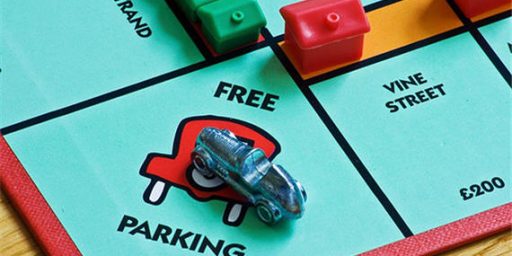
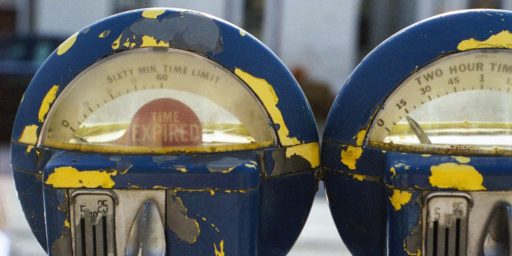
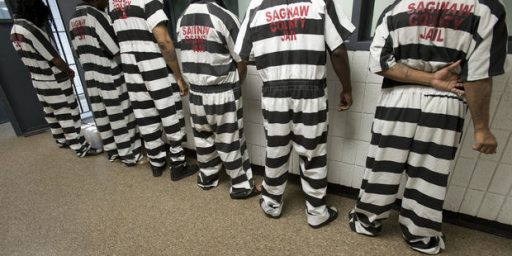

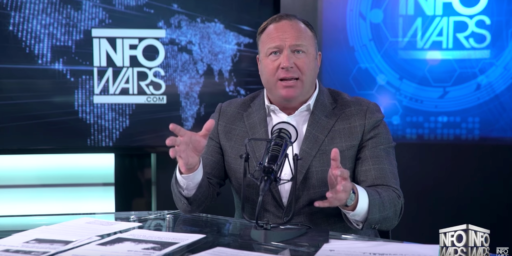
I suspect the reasoning isn’t correct either but I gotta admit that I really like the decision.
The old story about the McDonald’s hot coffee suit was partly driven by McD really having excessively hot coffee, but also, as I’ve read, more by McD not taking the suit seriously and sending a couple of young pup, arrogant lawyers who pissed off the jury and everyone else in the room. I can’t help but wonder if there isn’t a similar story here.
Just to fill in what seems to be a gap in the reporting, parking restrictions are not a matter of public safety, they’re a matter of allocating a scarce public resource in a fair way. The downtown merchants get really unhappy if they lose customers because people who work downtown all day took all the good parking spots. And, of course, the city abuses the situation to make a few bucks off fines. Given that it’s the City of Saginaw, I suspect they need the money way more than the scofflaw who brought the suit.
I wish that any of the people who think the court got it right could make up their mind about the rationale. As we saw, not even the ‘assenting’ justices in Jones could agree on why it was the right decision. That should tell you something right there.
It can’t be about privacy, because no privacy was violated. (It’s the exterior of a publicly-licensed vehicle on a public street, using public parking under public regulations.) It can’t be a search, because literally nothing was searched, and in particular nothing in which a privacy right inheres was searched. It could be a seizure, if you hold that the public official putting the chalk mark on the tire has improperly seized the car without warrant for long enough to do that — but nobody seems to be arguing that, and it’s hard to call it a seizure when the owner was never deprived of the full use of it for even a microsecond.
This has all of the earmarks of conservative jurisprudence — an emotionally-motivated ruling in search of just enough legal fig leaf to make it stick. Scalia would be proud.
Several weeks ago I was able to get tickets to a college basketball tournament game in a nearby city. The lots and parking decks were slap full. Finally, to my amazement, I spotted a car pulling out of a street space. I dodged right in and put what change I had in the meter, which bought about thirty minutes. A few hours later after the game I returned and there was no ticket. The parking gods were smiling that day.
Even if I had been given a ticket, It would have been no more than the parking lot’s cost of $20 or more. But they won’t come way over here to enforce a parking ticket, so I would probably just forget it.
@DrDaveT: I don’t have a dog in this fight, but I thought the rationale was that since SCOTUS has ruled that GPS trackers are a form of search, then this chalk mark is just a very primitive tracker and therefore also a form of search. Seems like a weak analogy, if only because a GPS tracker could reveal many different locations including private ones, whereas the chalk marks can only show one public location.
(Note that Alito and Sotomayor feel that people have a reasonable expectation to the privacy of their location data.)
@Franklin:
I’d say it’s even weaker than that, given that a GPS tracker can find you wherever you are (which really does sound like a search), whereas a chalk mark on a tire can only confirm that a car (not a person) is still at the location where it was already found before the chalk mark was ever made.
I can understand it (though not condone it) when Supreme Court Justices are totally ignorant of basic math and science. It’s much harder to understand when they are ignorant of basic logic and philosophy.
@DrDaveT:
The problem, it seems to me, is that we are calling on the Constitution to provide answers to questions that lie far outside its scope. Can you imagine going back in time and asking the Founders just what they thought about chalk on tires? They’d go running back to the warm embrace of King George. We’re scouring the Torah trying to ascertain whether God will be displeased should we use Siri on the Sabbath. Opinions diverge.
I’m probably in the minority here, but I don’t approve of this ruling. Over the last 10 years of my live, I’ve spent the majority of my professional life in Ft, Lauderdale, Atlanta, Austin, and Los Angeles – much of it in the downtown areas.
Here’s a hint. YOU’RE NOT ENTITLED TO PARK FOR 8 HRS IN A BUSY URBAN AREA IF THERE IS A TWO HOUR LIMIT.
Put your car in an effin’ lot or garage. Don’t feed the meter. Take your hour, or two, or four, or whatever is allowed then get the eff out!
I’m all for chalk marks, and look forward to this being overturned, because it’s ridiculous.
@Kit:
Forgive me if this sounds disrespectful, but to an atheist like me I can’t help but chuckle. I understand the quandary, but, damn, that’s quite the conundrum when looked at from the perspective of a religious devotee.
@EddieInCA: The city nearby has parking garages and lots, but they often charge more than what a parking ticket is. Rarely do I venture there, but I will take my chances on a ticket. They probably won’t enforce it on someone out of the county.
The chalk mark is the equivalent of a GPS…lo-tech, but just the same…it is tracking where you have gone, or in this case, where you haven’t gone.
If you want to generate ticket revenue put in meters.
What are you going to say when they start using toll booths to calculate your speed and then send you a ticket? Same “non-intrusive” search.
@Daryl and his brother Darryl:
I don’t understand how this is more of a “search” than shooting my car with radar or using a speed-tracking camera. I think the latter clearly violates the 6th Amendment’s right to confront witnesses, in addition to essentially reversing the burden of proof. But I don’t think it’s a “search” under the 4th Amendment.
@James Joyner:
It’s big brother keeping tabs on you. Tracking your movements. Hi-tech chalk.
@DrDaveT:
I suspect, with no evidence, this was a case of the scofflaw plaintiffs having more lawyer than the city. And in defense of the Supremes, or at least the Republican Supremes, I really don’t think it’s so much they can’t understand as that they need to not understand.
I have a general theory that a part of out problem is that most politicians are lawyers. They’re trained to furiously defend whichever side they happened to draw and leave it to the court to worry about truth and justice. They can become Republicans because their parents were, or because it pays better, and defend Republican policies without ever questioning whether they make any sense. Their job is advocacy, not philosophy. Then they become judges, who are supposed to worry about truth and justice, but old habits die hard.
@Tyrell: Yes, and you guys ought to be very careful not to sh!t on that. The last time I was in Portland, Oregon, and parked my car on the street, free parking was by residential permit only and metered parking–buy a ticket and run back to place it in your window before parking enforcement gets there–I bought one hour of parking for $5.75, Visa, Mastercard, and Discover accepted. The change came from several hundred thousand dollars in unpaid parking fines.
@EddieInCA:
I haven’t noticed many people in this thread defending the ruling; perhaps I’ve just been inattentive. I certainly think it’s idiotic. But then I tend to think that the city/county/state has lots of authority to tell you where and how you may drive and park your state-licensed-and-registered vehicle on public roads and parking areas… and to enforce that.
@Daryl and his brother Darryl:
Well, except for the part where it can’t find you if it doesn’t already know where you are, can’t follow you around, can’t reconstruct your movements, … No, actually it is nothing at all like GPS.
It isn’t tracking anything. You can’t track stationary things; you can only sit and stare at them.
In particular, it isn’t tracking YOU, because you are not in your car, which is stationary. Nobody is putting a chalk mark on your shoes, then following you around using the chalk mark. Which really might be almost like the GPS, but only almost.
Then again, I’m ok with the GPS, and giving people tickets for speeding based on tollboth times, and red light / radar camera tickets. I think James’s 6th Amendment argument is inane, because you certainly do have the right to confront your accusers in court, and to bring expert testimony, and to cross-examine… if you’re stupid enough to waste money and time like that.
People seem to be losing track of the fact that this is not about how you behave on private property, or in a hotel room, or in any old public place. It’s about how you exercise a state-granted license on state-provided-and-maintained infrastructure. You can park for however long you want in your own garage, with or without chalk marks.